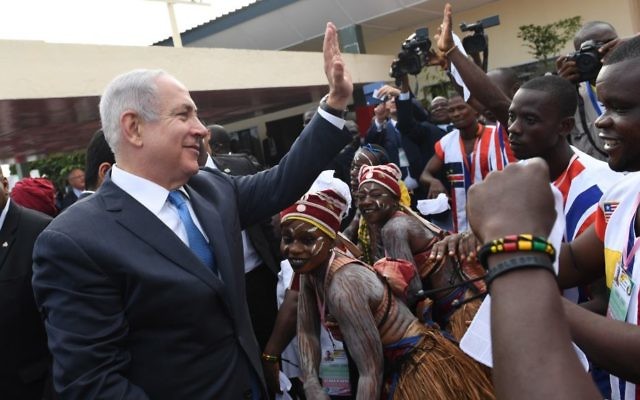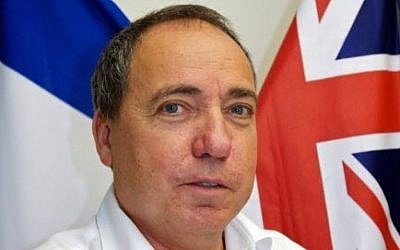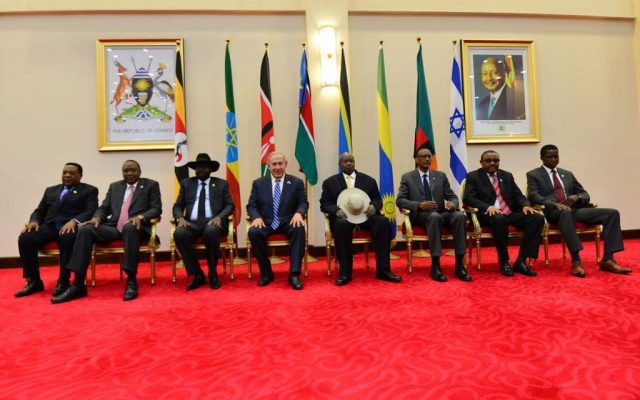Foreign Ministry director Yuval Rotem says Arab pressure that prompted the scrapping of major event in Togo paradoxically shows Jerusalem on the right track

This week’s sudden cancellation of a major Israel-African summit in Togo paradoxically shows that Jerusalem’s rapprochement with the continent is succeeding, a senior Israeli diplomat said this week.
“It’s been a number of weeks now that we’ve been noticing certain islands of opposition to Israel’s journey to Africa, which is an expression [of] Israel’s success in entering Africa. This is actually a paradox: if it wasn’t so successful, it wouldn’t be so significant,” Foreign Ministry director-general Yuval Rotem told The Times of Israel.
“The journey to Africa is a long journey. It will take a few years,” he added. “It requires of us investment and perseverance. And along the way, there will be obstacles, but we will overcome them.”
On Monday, Togo asked Jerusalem to postpone the Africa-Israel Summit, which was scheduled to take place in its capital city Lome on October 23-27. Explaining his decision, Togo President Faure Gnassingbe cited “elaborate preparations” needed to secure the event’s success.
The open-ended delay followed pressure by “some Arab players and members of the African bloc,” Rotem said. Other Israeli officials tried to downplay foreign influences in Togo’s decision to push off the summit, instead blaming “domestic issues” within the country.

“There are reasons that you can say on the surface, and there are reasons that you don’t see. We will know them when the time comes,” Rotem said.
Prime Minister Benjamin Netanyahu, who has visited Africa twice in the last 16 months, was scheduled to travel to Lome as well. But his previous visits to the continent — including a trip in June to Liberia, where he meet with numerous West African leaders — aroused “among some players a certain discomfort, which apparently lead them exert pressure on Togo,” Rotem said.
Fourteen African heads of states had already confirmed their participation in next month’s summit, Rotem said. “That’s a great achievement. But we want something even bigger. And we need more time for this.”
After the Jewish holidays, Foreign Ministry officials will travel to Africa to reassess the situation and scout for a country to host the event, according to Rotem.

“We need to build a better coalition to allow all the players that support Israel a little bit of boldness for this process. And I think we’re doing not badly,” he told The Times of Israel, at the sidelines of Netanyahu’s visit to Argentina this week.
Under the motto “Israel is coming back to Africa and Africa is coming back to Israel,” Netanyahu has declared diplomatic outreach to Africa as one of his signature foreign policy objectives. Offering African states development aid, economic cooperation, and anti-terrorism know-how, Netanyahu aims to use support from the continent to break the traditional anti-Israel majority in international organizations such as the UN.
Last month, Israel played down pro-Palestinian efforts to obstruct the summit, with officials expressing confidence that Netanyahu would meet with African leaders keen on promoting political and economic ties with the Jewish state there.
“This is not taking place without contrary pressure,” Netanyahu told his cabinet ministers, referring to the summit. “Various pressures have been placed on the Togolese president to cancel the conference. These pressures are the best testimony to the success of our policy, of Israel’s presence in Africa.”
In addition to strong opposition to the summit from Ramallah, Morocco was leading African efforts to cancel the event.
South Africa, too, made efforts to derail the summit. In July, the country’s ruling party, the African National Congress, issued a “discussion document” calling for efforts to sabotage Israel’s rapprochement with African states in general and the planned meeting in Togo in particular.
Following the decision to postpone the summit this week, the Foreign Ministry said no pressure would make Israel back down from its work to strengthen the relationship with African nations.
“Israel will continue its growing efforts in Africa as it has done in recent years,” the statement said.
As reported by The Times of Israel
